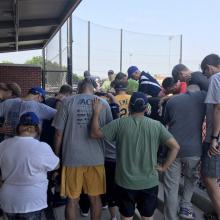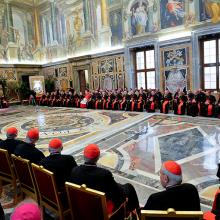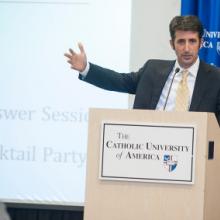U.S. Conference of Catholic Bishops
Political and religious leaders offered prayers for Rep. Steve Scalise and four others who were injured in a shooting during a GOP congressional baseball practice.
The Democratic team stopped their practice following the shooting on June 14 in Alexandria, Va.
Catholics, Jews, Protestants, Muslims, and others reacted vigorously and emotionally to President Trump’s announcement that he will withdraw the United States from the 2015 Paris climate change agreement.
While leaders of the so-called religious left were overwhelmingly critical of the move, conservatives were somewhat divided.
During our nearly 40 years of friendship, I led several interreligious missions with Keeler, including meetings with then-Pope John Paul II at the Vatican. We co-led trips to Israel, including a visit to a civilian bomb shelter, and a poignant painful pilgrimage to the infamous death camps of Auschwitz-Birkenau.
Sometimes public figures can seem distant and impersonal, but that was never the case with the always gracious and welcoming Keeler.
As Pope Francis marks the fourth anniversary of his revolutionary papacy, the pontiff apparently finds himself besieged on all sides by crises of his own making: an open “civil war” in the Catholic Church and fears of schism, mounting opposition from the faithful, and a Roman Curia so furious with his reforms that some cardinals are plotting a coup to topple him.
The former U.S. religious freedom ambassador told a congressional subcommittee that leaked language of a proposed presidential executive order on religious liberty could cause “constitutional problems.”
“I think it raises very serious equal protection issues,” said Rabbi David Saperstein, who recently ended his tenure at the U.S. State Department.

Image via Rena Schild/Shutterstock.com
Lost amid the ongoing furor over President Trump’s travel ban, and the ecstasy (and agony) over his first pick for the Supreme Court, was another move on Jan. 31 that is starting to give social conservatives pause: Trump’s continuance of the executive order by President Obama’s policy that protects gay and transgender employees from discrimination while working for federal contractors.
And not only did Trump extend the protections, but he did so in powerful language that used the community’s own “LGBTQ” identifier, while vowing that Trump would be “respectful and supportive of LGBTQ rights.”
For much of its long history in the U.S., the Catholic Church was known as the champion of the working class, a community of immigrants whose leaders were steadfast in support of organized labor and economic justice – a faith-based agenda that helped provide a path to success for its largely working-class flock.
In recent decades, as those ethnic European Catholics assimilated and grew wealthier, and as the concerns of the American hierarchy shifted to battles over moral issues, such as abortion and gay marriage, traditional pocketbook issues took a back seat.
If I’ve learned anything since my time in Rome, it’s that people — not just Catholics — are hungering to connect peace with justice. This is why those of us who traveled to Rome just before the election, accompanied by Stockton, Calif., Bishop Stephen Blaire, and Houma-Thibodaux, La., Bishop Shelton Fabre, are preparing for a regional WMPM meeting in Modesto, Calif., in February.
The president of the U.S. Conference of Catholic Bishops kicked off a gathering in St. Louis of approximately 250 of the nation’s bishops by referring to Ferguson.
“We mourn those tragic events in which African-Americans and others have lost their lives in altercations with law enforcement,” said a statement prepared by Archbishop Joseph E. Kurtz of Louisville, Ky., which was read by Bishop Ronny Jenkins, general secretary of the U.S. Conference of Catholic Bishops on June 10.
“Racism is an evil which endures in our society and in our church.”
The U.S. Catholic bishops have welcomed the Obama administration’s tentative agreement aimed at limiting Iran’s nuclear ambitions, and their top spokesman on international affairs bluntly warned Congress against doing anything to undermine it.
The bishops “oppose efforts that seek to undermine the negotiation process or make a responsible multi-party agreement more difficult to achieve and implement,” Bishop Oscar Cantu, chairman of the bishops’ Committee on International Justice and Peace Committee, wrote to House and Senate lawmakers on April 13.
“The alternative to an agreement leads toward armed conflict, an outcome of profound concern to the Church,” said Cantu, who heads the Diocese of Las Cruces, N.M.
The warning — and accompanying support in a letter of commendation that Cantu sent last week to Secretary of State John Kerry — follow a thumbs-up from Pope Francis to the proposed accord, and coincides with an endorsement on April 13 by a group of largely liberal mainline Protestant leaders.
Diplomats from the U.S. and six world powers meeting in Switzerland earlier this month unveiled the framework of what could be an historic accord to inspect Iran’s growing nuclear program and prevent it from developing a nuclear weapon.
The nation’s Catholic bishops are jumping into the increasingly contentious battle over immigration reform by backing President Obama’s pledge to act on his own to fix what one bishop called “this broken and immoral system” before Republicans assume control of Capitol Hill in January.
In an unscheduled address Nov. 11 at the hierarchy’s annual meeting, Seattle Auxiliary Bishop Eusebio Elizondo, chairman of the migration committee of the U.S. Conference of Catholic Bishops, said the USCCB would continue to work with both parties to pass comprehensive immigration reform.
But, Elizondo said, given the urgency of the immigration crisis and the electoral gains by Republicans who have thwarted earlier reform efforts, “it would be derelict not to support administrative actions … which would provide immigrants and their families legal protection.”
“We are not guided by the latest headlines but by the human tragedies that we see every day in our parishes and programs, where families are torn apart by enforcement actions especially,” he said.
During the summer, the president was moving toward unilateral action on immigration, despite warnings that such moves could exceed his constitutional authority or would turn voters against reform.
Then in early September, Obama said he would delay acting on his own, a move that was seen as a way to protect vulnerable Democrats from any backlash in midterm elections. On Sunday, Obama told CBS’ “Face the Nation” that he was now “going to do what I can do through executive action.”
“It’s not going to be everything that needs to get done. And it will take time to put that in place,” he said.
With a controversial Vatican summit on family life just concluded and a papal visit to the U.S. expected in less than a year, the nation’s Catholic bishops on Nov. 10 began taking steps to adapt their agenda to the priorities Pope Francis set out — an emphasis on social justice and on creating a more welcoming church.
That change in focus has unsettled a number of American bishops who have been used to a hierarchy oriented more toward hot-button culture war issues like fighting abortion, gay marriage and the Obama administration’s contraception mandate.
The new shift was underscored by last month’s summit, called a synod, where many churchmen used unusually positive language in referring to gay people and cohabiting couples and others who do not always follow church teachings on family life.
In addition, the announcement Nov. 8 that Francis moved U.S. Cardinal Raymond Burke, a vocal conservative and critic of the pope’s approach, out of his curial post, combined with the pope’s surprise choice of low-profile prelate Blase Cupich as archbishop of Chicago have upended long-standing assumptions about how the church operates.
The bishops “still haven’t fully processed what’s taking place right now,” said Rocco Palmo, who runs a popular Catholic website, Whispers in the Loggia.
Pope Francis on Tuesday waded into the controversy of the wave of unaccompanied minors arriving at the U.S.-Mexico border, calling for an end to racism against migrants and pushing the U.S. to offer greater protection for young children entering the country illegally.
“Many of their rights are violated, they are obliged to separate from their families and, unfortunately, continue to be the subject of racist and xenophobic attitudes.”
The Argentine pontiff said a different approach is needed to tackling what he called a “humanitarian emergency” as growing numbers of unaccompanied children are migrating to the U.S. from Central America and Mexico.
Catholic bishops returned to Capitol Hill on Thursday with a renewed push for immigration reform, as Miami Archbishop Thomas Wenski called the failure to address immigration reform “a stain on the soul of our nation.”
Before fanning out to meet with lawmakers, members of the U.S. Conference of Catholic Bishops’ Committee on Migration held a Mass at a Capitol Hill church that recalled a dramatic Mass they held April 1 along the U.S.-Mexican border.
Wenski, the committee’s chairman, said, “When laws fail to advance the common good, they can and they should be changed.”
The bishops’ push was accompanied by a separate open letter to House Speaker John Boehner, a Catholic, signed by 30 Catholic leaders, including the Rev. Larry Snyder, CEO of Catholic Charities USA, and the Rev. Thomas H. Smolich, who oversees Jesuit priests in the U.S.
When President Obama and Pope Francis sit down at the Vatican on Thursday, the meeting may well offer a vision of what could have been for Democrats and the Catholic Church over the last six years: a leader of the state and a leader of the church working on the many issues where they agree while working through the issues where they don’t.
Of course, that’s not exactly how it’s gone for Obama and the U.S. hierarchy, even though Obama and the church both stress economic justice and the priority of the common good, universal health care, robust government support for the needy and comprehensive immigration reform.
The potential for a robust alliance fizzled almost from the start of Obama’s candidacy in 2007, and a relationship that began badly went downhill when he was elected.
After I met Pope Francis during a visit to the Holy See in October, I remarked that if I were choosing a parish based upon the pastor, he would be my pastor. Now, he is the world’s pastor.
Since his election a year ago on March 13, Pope Francis has provided inspiration in many ways:
As a communicator, he speaks in a fresh and creative yet very simple style. And like Jesus, he uses images that people understand while communicating profound theological truth. Forthright, authentic, and courageous in his communication, Pope Francis also humorously challenges us, as he calls us not to be “sourpusses,” “whiners,” or “princes.”
A group of leading Catholic activists and academics has renewed criticism of Catholic University of America over a large gift from the billionaire industrialist and conservative funder Charles Koch, and over a school official’s statements that seem to endorse Koch’s questioning of climate change and the right of public workers to unionize.
In a letter sent on Monday to CUA President John Garvey and Andrew Abela, dean of CUA’s new business school, more than 50 Catholic signatories said Charles Koch and his brother, David, “have a clear political and ideological agenda.”
The Kochs’ libertarian-leaning positions, they said, “are in direct conflict with traditional Catholic values.”
Dozens of Catholic leaders are protesting the decision by the Catholic University of America to accept a large donation from the foundation of Charles Koch, a billionaire industrialist who is an influential supporter of libertarian-style policies that critics say run counter to church teaching.
Charles Koch and his brother, David, “fund organizations that advance public policies that directly contradict Catholic teaching on a range of moral issues from economic justice to environmental stewardship,” says a four-page letter to CUA President John Garvey, released Monday.
The letter was signed by 50 priests, social justice advocates, theologians, and other academics, including several faculty at CUA in Washington.
After serving as vice president of the U.S. Conference of Catholic Bishops for the past three years, there was little surprise when Archbishop Joseph Kurtz of Louisville, Ky., was elected this week to the top post in the American hierarchy.
Yet the nearly 250 churchmen would have been hard-pressed to find a better president to help them pivot toward the new, more pastoral path set out in recent months by Pope Francis.
Kurtz has earned his stripes with the hierarchy’s conservative wing thanks to his past work heading their campaign against gay marriage, but he was also molded by his early years as a pastor and his work in social justice — experiences he mentioned early and often when facing reporters after his election on Tuesday.
As the U.S. Catholic bishops began their annual fall meeting on Monday, they were directly challenged by Pope Francis’ personal representative to be pastors and not ideologues — the first step of what could be a laborious process of reshaping the hierarchy to meet the pope’s dramatic shift in priorities.
“The Holy Father wants bishops in tune with their people,” Archbishop Carlo Maria Vigano, the Vatican ambassador to the U.S., told the more than 250 American churchmen as he recounted a personal meeting in June with Francis.
The pontiff, he added, “made a special point of saying that he wants ‘pastoral’ bishops, not bishops who profess or follow a particular ideology,” Vigano said. That message was seen as an implicit rebuke to the conservative-tinged activism of the bishops’ conference in recent years.
Almost since his election in March, Francis has signaled that he wants the church to strike a “new balance” by focusing on the poor and on social justice concerns and not overemphasizing opposition to hot-button topics like abortion and contraception and gay marriage — the signature issues of the U.S. bishops lately.


















